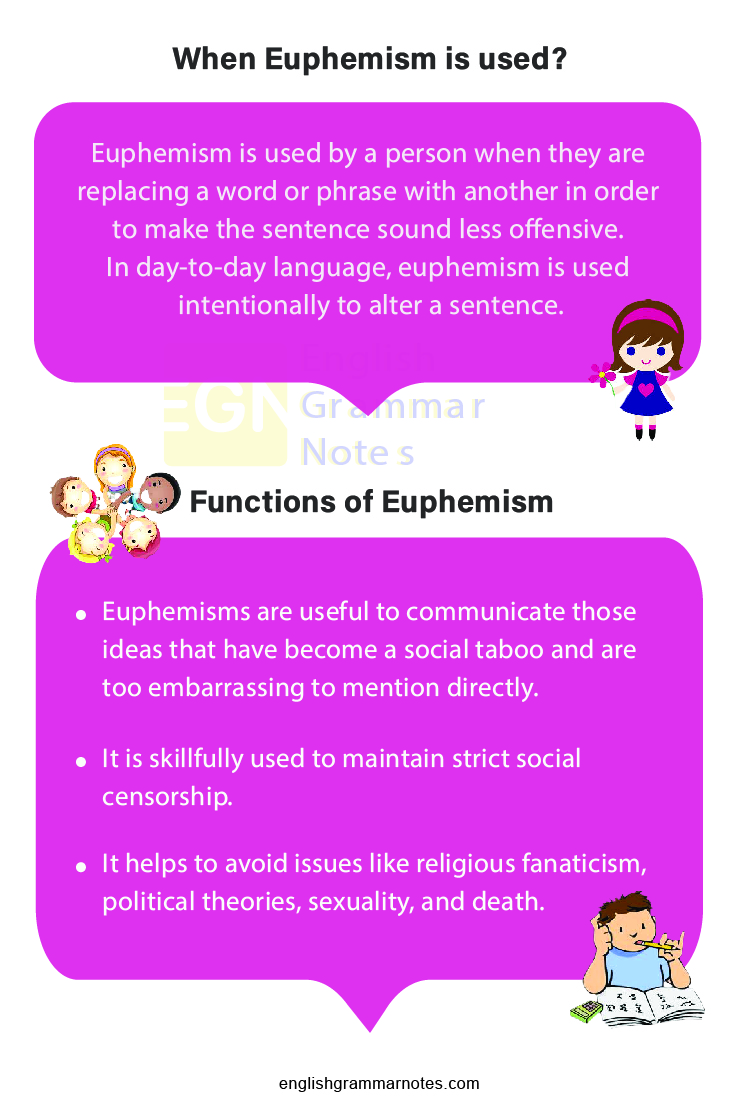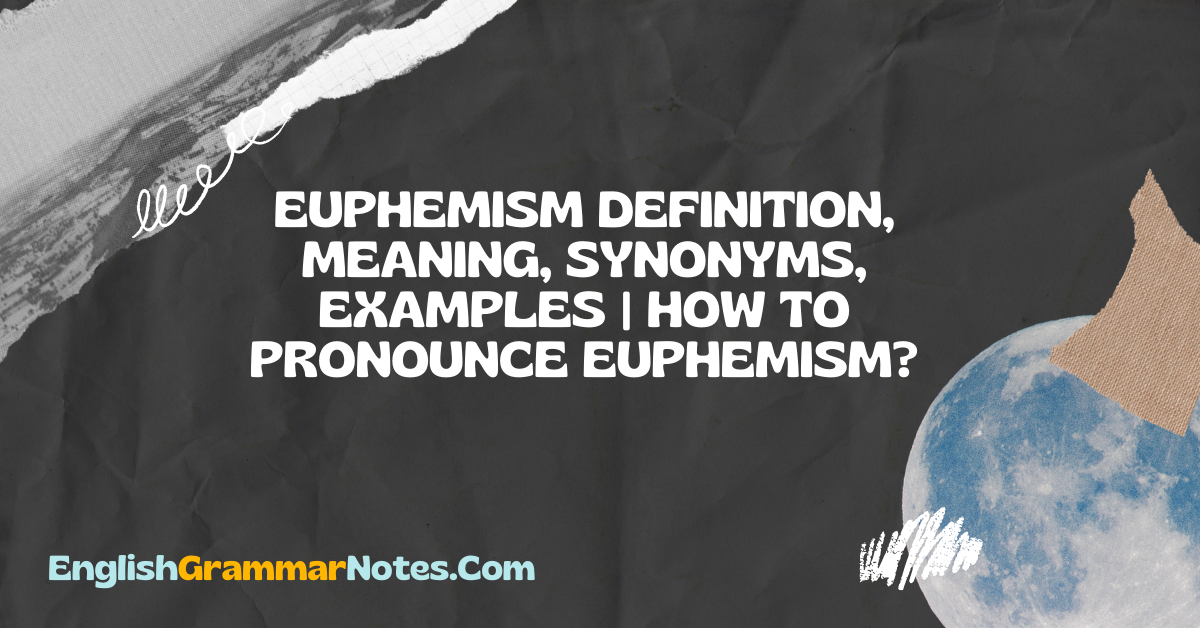Euphemism is a literary practice of using a comparatively milder or less abrasive word of a negative word instead of its original. Blunt forms of words are used that sound pleasant to hear. This is used when writing about unpleasant subject matters such as sex, violence, and crime.
Soft words are used instead of harsh or blunt words in simple words. A statement is said in such a way that something unpleasant is said in an agreeable way. Euphemism can be seen in two possible ways one is Positive Euphemism and the other is a Negative Euphemism.
- Euphemism Examples
- Use of Euphemism in Sentence
- Euphemism in Literature
- When Euphemism is used?
- Types of Euphemism
- Functions of Euphemism
- Why do Writers Use Euphemisms?
- Downsides of Euphemism
- FAQs on Euphemisms
Euphemism Examples
- Going to the other side for death.
- Between jobs for the unemployed.
- Golden years for old age.
- Handcrafted for handmade.
- Big-boned for fat.
- Restroom for toilet room.
- Garbage man – sanitation engineer
- Old people – senior citizen
- Pregnant – in the family way
- Die – pass away
- The dead – the deceased/ the late
- Burier – undertaker/mortician
- Lunatic asylums – mental institutions
Use of Euphemism in Sentence
- Kicked the bucket which is a euphemism for dead.
- Out of work is a euphemism for the unemployed.
- Passing wind is a euphemism for farting.
- Not all there is a euphemism for being a little crazy.
- Being with a child is a euphemism for being pregnant.
Euphemism in Literature
- “He ploughed her and then she cropped”. It is a euphemism that means they had sex and she became pregnant.
- In another play, Othello, Shakespeare uses euphemism once again about the act of sex, where he described it as “making the beast with two backs”.
- Hardy also uses more euphemisms to talk about death in the same poem, this time he writes the line” if I am to pass in some nocturnal darkness”.
Read More:
When Euphemism is used?
Euphemism is used by a person when they are replacing a word or phrase with another in order to make the sentence sound less offensive. In day-to-day language, euphemism is used intentionally to alter a sentence. With this, the harshness of the sentence can be removed without actually changing the meaning of the sentence.
If a person visiting a fancy restaurant, will not announce that he is going to take a pee. Instead, you may take a euphemism such as “I am going to use the bathroom ‘. This would imply the same thing but in a much more pleasant way.
Types of Euphemism
There are several kinds of euphemisms that we can use in our writings and spoken language.
- Abstraction: These are euphemisms that are not clearly expressed or easily understood. They reflect unpleasant realities such as “gone to a better place” to discuss death.
- Indirection: Adding distance from particular actions that may sound too unpleasant to practice, such as “sleeping together” for having sex, is an indirection.
- Litotes: Litotes address softening or underplaying something with double negatives. The example is “He’s not attractive, ” is an instance of litotes.
- Mispronunciation: To suggest or call attention indirectly to words that are not of choice. People might use mispronunciation such as “jeez” or “frigging”.
- Personification: This is when people give a personal name to something they would rather not discuss publicly. For example, referring to the onset of menstruation.
- Slang: This form of speech can include euphemisms that are loud in meaning for simple words. For example, pissed can be used as a replacement for anger.
Functions of Euphemism
- Euphemisms are useful to communicate those ideas that have become a social taboo and are too embarrassing to mention directly.
- It is skillfully used to maintain strict social censorship.
- It helps to avoid issues like religious fanaticism, political theories, sexuality, and death.
- In short, euphemism is a useful tool that allows authors to write figuratively about difficult issues.

Why do Writers Use Euphemisms?
- Euphemism can serve several different purposes in writing.
- They allow writers to avoid taboo( restricting a particular practice or forbidding association with a particular person).
- It even helps to narrate something on topics, Topics which are particularly written on a continuous note such as events or stories.
Downsides of Euphemism
The possible downside of euphemism is that it can come across as vague (uncertain or indefinite), or dishonest. The matters that are easily shocked such as sex or nudity cannot be discussed openly. Due to this, writers must use euphemisms mindfully with keeping the audience and occasion in mind.
FAQs on Euphemisms
1. What is the meaning of euphemism?
Euphemism is the use of mild or pleasant words or phrases instead of one that is unpleasant or offensive. Common examples include:
- Dearly departed- died.
- Comfort station- toilet.
- Kick the bucket- die
- Ethnic cleansing- genocide.
2. Are euphemisms metaphors?
Euphemisms are harmless words or phrases that may be used as a suggestive one. Example: A bun in the oven would be a euphemism for pregnant. Metaphors are generally used for comparing two unlike things together.
3. Are euphemisms idioms?
A euphemism is a certain type of English idiom, which is a group of words, or phrases that has a figurative meaning that cannot be easily removed from its actual meaning.
4. Is euphemism a poetic device?
Euphemism is an excellent literary device for writers and poets. It mostly helps to communicate meaning when it comes to these painful subjects. Figurative language (It is a way of expressing oneself that does not use strict words), with this, the readers can feel less confronted as they might sound harsh to hear.
5. Is euphemism a type of diction?
Euphemisms are types of figurative language in which a certain topic is considered indefinite. Euphemisms help to neutralize words that come up with harsh or insensitive meanings.
